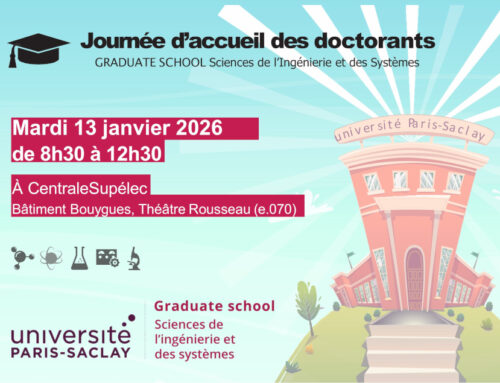Intership offer : Design and Validation of an Adaptive Virtual Reality Simulator for Medical Motor Skill Training
Keywords : Human–Computer Interaction, Virtual Reality Training, Adaptive Learning, Physiological Sensing, Stress Modulation, Cognitive Load, Microsoft Psi, Data Synchronization
Host Structure and Laboratory
Université d’Évry–Paris Saclay (UEVE) | IBISC Laboratory – IRA2 Team
Funding
~3500 € for the 6-month period
(Scholarship by Genopole, https://genopole.agorize.com/fr/challenges/master–2–2024)
Internship Supervisor
- Name: Aylen RICCA, Associate Professor (Maître de Conférences)
- Address: IBISC Laboratory, IRA2 Team
- Department of Electrical and Computer Engineering IUT, Université d’Évry Paris-Saclay
- 36 rue du Pelvoux, 91080 Évry-Courcouronnes, France
- Phone: +33 1 69 47 75 54
- Email:
Internship Period
Starting date: 01/12/2025 (possibility to work remotely during the first month). Duration: 6 months.
This internship may serve as a preliminary step toward the preparation of a PhD project, with potential opportunities for applying to thesis funding
How to Apply
Applications are open to Master 2 students (or equivalent level) in Computer Science, Software Engineering, or related fields.
Interested candidates should send the following documents by email to :
-
- An extended CV (including relevant technical skills and project experience)
- Academic transcripts/marks from their Master’s program
- A portfolio and/or links to GitLab/GitHub repositories (if available)
Selected candidates will be invited to schedule a first online meeting to discuss the internship project.
Context and Motivation
Adaptive training in Virtual Reality (VR) is an emerging research direction for enhancing motor skill learning in domains such as medicine and industry. Traditional VR training systems offer immersive practice but typically rely on fixed scenarios or correlations between physiological states and performance. The challenge is to design truly adaptive systems capable of adjusting training difficulty, pacing, and feedback in real time based on the learner’s physiological and performance data.
This internship is part of the AMoLeVR project, aiming to design and validate an adaptive training simulator that personalizes motor learning by dynamically adjusting tasks according to the user’s physiological signals (e.g., heart rate, EEG signals, stress indicators) and performance outcomes.
Objectives of the Internship
The intern will participate to these activities:
-
- Literature Review & Functional Analysis o Study adaptive mechanisms for motor skill training in VR. o Identify functions relevant for adapting difficulty, rhythm, sensory feedback, and pedagogical strategies.
- Platform Development (Core Technical Work) o Design and implement a software architecture for synchronous multimodal data acquisition using Microsoft Psi (Platform for Situated Intelligence).
- Integrate physiological sensors (e.g., heart rate, galvanic skin response, EEG) and performance tracking within the VR application.
- Ensure synchronization and recording of data streams (physiology, VR events, motion capture).
- Develop real-time adaptation modules that adjust VR training scenarios according to incoming data.
- Experimental Validation o Design user studies comparing adaptive vs. non-adaptive training conditions. o Analyze results statistically to assess learning efficiency, stress modulation, and cognitive load. o Provide recommendations for improving adaptive training mechanisms.
Resources
The student will benefit from the Evr@ VR platform, which includes:
- VR and Mixed Reality headsets (Varjo, Meta Quest, etc.)
- Motion tracking systems (optical cameras, gloves, positional trackers)
- Haptic and force-feedback devices
- Physiological sensors (heart rate monitors, GSR, EEG)
- Software stack including Microsoft Psi, ROS2, Unity3D/Unreal Engine, and existing VR simulators
Expected Technical Contributions
- Development of a modular data recording and synchronization platform based on Microsoft Psi.
- Implementation of adaptive training logic using performance and physiological metrics.
- Integration with a VR application for motor skill learning (medical training focus).
- Experimental validation and documentation of the simulator.
Candidate Profile
- Required:
- Master’s student in Computer Science, Software Engineering, or related fields o Strong background in software architecture and development o Solid knowledge of Object-Oriented Programming (Java, C#, or C++)
- Other skills:
- VR development skills (Unity3D, Unreal Engine) o Familiarity with ROS2 or middleware for sensor/robot integration o Experience with statistical data analysis (R, SPSS)
The candidate must have a good communication level in English, both written and spoken, as part of the work and reporting will be conducted in English.
- Date de l’appel : 16/09/2025
- Statut de l’appel : Pourvu
- Contacts cotés IBISC : Aylen RICCA (MCF IUT Évry, IBISC équipe IRA2)
- Sujet de stage niveau Master 2 (format PDF)
- Web équipe IRA2
- Web Plateforme EVR@





